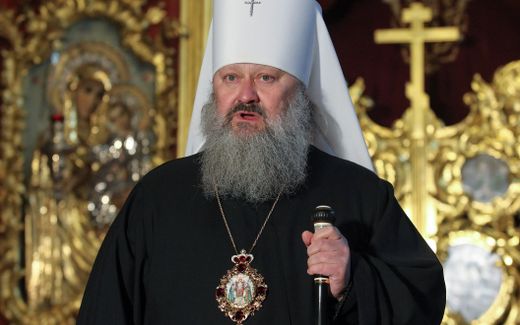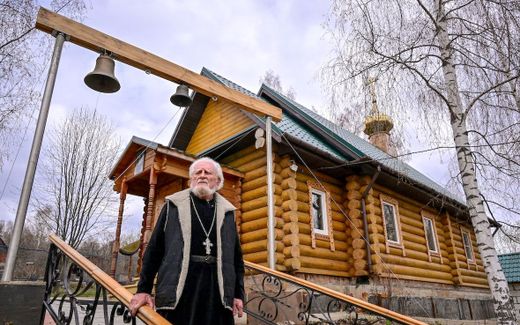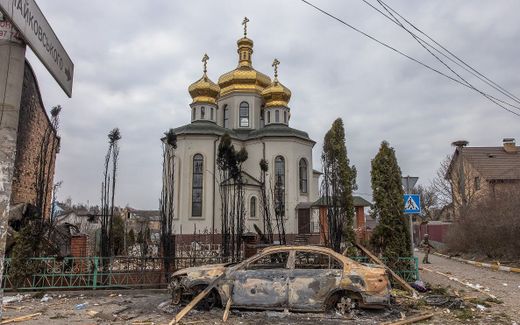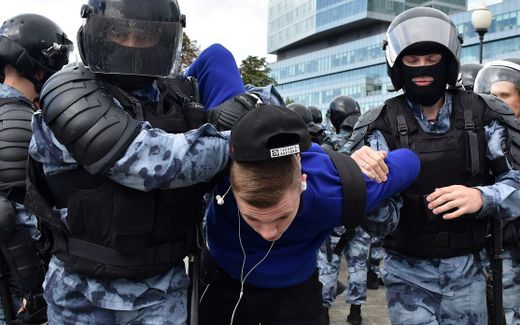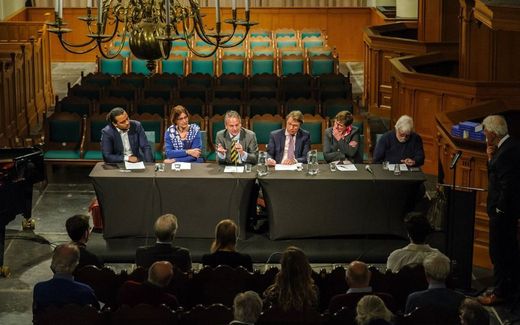Russia uses punitive psychiatry, just as in the Soviet time
21-11-2025
Eastern Europe
Dr. Arie Bloed
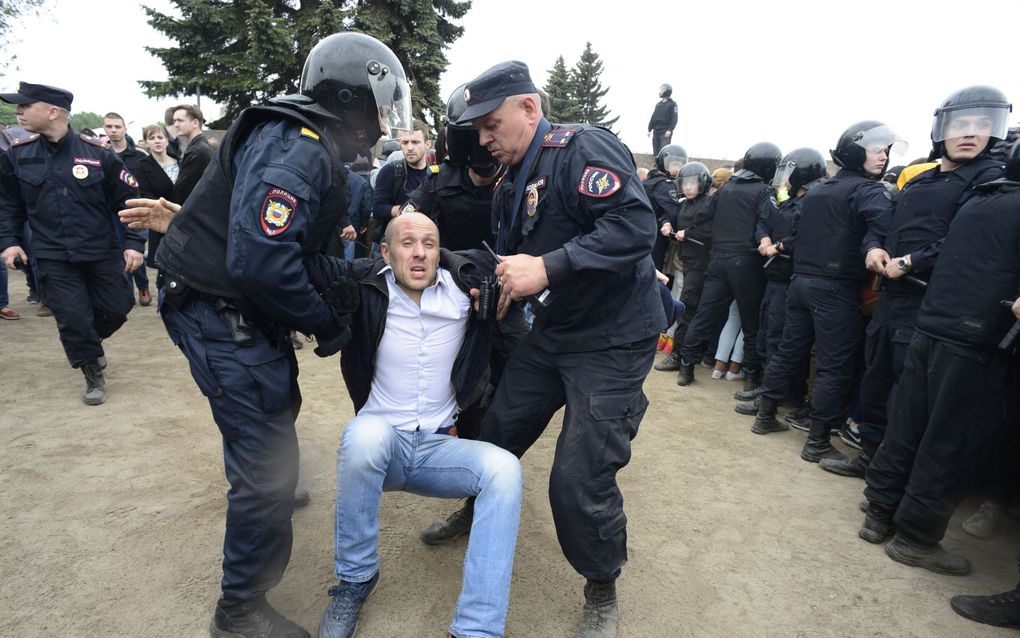
Russian police officers attempt to detain a participant an Alexei Navalny-led opposition rally in St. Petersburg, Russia. Photo AFP, Olga Maltseva
Eastern Europe
“An evil empire.” This famous characterisation of the Soviet Union by then U.S. President Ronald Reagan in 1983 has become a permanent part of our history books.
Reagan used this harsh condemnation of the totalitarian Soviet system partly because of its systematic violations of human rights, including the use of psychiatry to silence political opponents.
Sadly, the old adage that “history repeats itself” once again proves true: under Russia’s current leader, Vladimir Putin, this grave Soviet-era abuse has resurfaced with troubling force.
During the Soviet period, psychiatry was widely deployed to neutralise dissidents—the label used for political opponents of the communist regime. They were not only detained but also subjected to heavy medication intended to alter their mindset, often with devastating effects on their mental health.
Many psychiatrists cooperated, partly because they could not fathom why anyone would oppose a regime ostensibly devoted to human welfare. So, people in opposition to the communist regimes were often seen as troublemakers who clearly had lost their mind. Increasingly, these practices came to be known as “punitive psychiatry”—psychiatric treatment used as a form of punishment.
Although such abuses had already begun to reappear under Putin, Russia’s invasion of Ukraine seems to have accelerated the use of psychiatry as a tool to silence critics of the regime. During the Cold War, the West sharply criticized Moscow for these practices, yet today one hears almost nothing about them—even though the methods now used closely resemble those of earlier decades.
Why is there so little protest today?
One reason is that today these abuses occur mainly outside major centres such as Moscow and St. Petersburg—particularly in remote provincial cities across European and Asian Russia—and are not directed at widely known dissidents.
In Soviet times, the authorities targeted prominent critics from large urban centres, which attracted international attention. Now, although the number of foreign journalists in major Russian cities has dwindled, they are almost entirely absent in the regions.
This allows authorities to remove opponents from the streets with near impunity, committing them to psychiatric institutions where they may endure humiliating treatment for indefinite periods. At the same time, the authorities appear careful not to apply such practices in Russia’s major metropolitan areas.
Moreover, whereas cases of abuse of psychiatry in Soviet times numbered in the thousands, nowadays these numbers are (still) considerably lower, although increasing.
Another reason for the lack of attention is that the world’s focus is currently dominated by the horrific crimes committed by the Russian military in the brutal war against Ukraine, where civilians are deliberately targeted.
As a result, the worsening political climate inside Russia receives far less scrutiny than it deserves. Even within organisations such as the Organization for Security and Co-operation in Europe (OSCE)—where such abuses once were more or less a standard item on the agenda—debates are now overshadowed by the violence unfolding on the Ukrainian battlefield.
A further difference from Soviet times is Russia’s increasingly repressive legal framework, which has made silencing dissent easier than ever. In 2022, the Russian criminal code was amended in a hurried way to criminalise “false information” about the army or actions deemed to discredit the armed forces. The same criminal code allows judges to order the forced psychiatric hospitalisation of people committing “socially dangerous acts”—a designation that in practice can be extended indefinitely.
Those who speak out against Russia’s aggression toward Ukraine are frequently accused of such behaviour and can be confined with minimal legal procedure. Since judicial independence in Russia has ceased to exist in any meaningful sense, victims have virtually no protection against such abuses.
Professional associations such as the Federation Global Initiative on Psychiatry have condemned these developments, but the general public remains largely unaware of the degrading actions perpetrated by the Russian authorities.
Earlier this year, the now-banned Russian human rights organisation Memorial identified 48 cases in which psychiatric measures were used to silence political opponents.; Aall but two of the individuals involved were in detention.
The UN Special Rapporteur on Human Rights in Russia, Bulgarian expert Mariana Katzarova, reported 51 documented cases of forced psychiatric treatment in her most recent submission to the UN Human Rights Council in September this year. A year earlier, she had already warned: “The increased use of punitive psychiatry against those who peacefully exercise their human rights is a concerning trend, alarmingly reminiscent of Soviet times.”
Earlier this year, independent journalist Maria Ponomarenko from the Altai Krai region in Siberia—already sentenced to six years in prison for allegedly defaming the Russian armed forces—was additionally subjected to compulsory psychiatric treatment. It is, of course, highly likely that more cases of abuse exist but remain undetected.
Religious minorities are also targeted
This practice is not reserved solely for opponents of the war in Ukraine.; Rreligious minority groups are targeted as well. These are often members of smaller movements commonly labelled as “sects,” which generally enjoy little sympathy within Russian society. The fact that authorities portray such believers as mentally unsound rarely provokes resistance.
Members of the Jehovah’s Witnesses, banned in 2017, are sometimes treated in this way, as are certain other Protestant groups. Baptists have also faced persecution in recent years, particularly in Russian-occupied parts of Ukraine, though thankfully there are few, if any, known cases of psychiatric abuse against them.
Although international protests seem to have little immediate effect, it remains essential that they continue and intensify—if only to signal to the dictatorial regime in Moscow that the international community still views its actions with profound disgust.
Dr. Arie Bloed is an expert on international law, human rights, and Eastern Europe. He previously served as Professor of International Law at Central European University and as Associate Professor at Utrecht University. He was Editor-in-Chief of Security and Human Rights for many years and co-founded the Netherlands Helsinki Committee.
Related Articles

